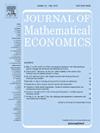Resolute and symmetric mechanisms for two-sided matching problems
IF 0.7
4区 经济学
Q3 ECONOMICS
引用次数: 0
Abstract
We focus on the one-to-one two-sided matching model with two disjoint sets of agents of equal size, where each agent in a set has preferences on the agents in the other set modeled by a linear order. A matching mechanism associates a set of matchings to each preference profile; resoluteness, that is the capability to select a unique matching, and stability are important properties for a matching mechanism. The two versions of the deferred acceptance algorithm are resolute and stable matching mechanisms but they are unfair since they strongly favor one side of the market. We introduce a property for matching mechanisms that relates to fairness; such property, called symmetry, captures different levels of fairness and generalizes existing notions. We provide several possibility and impossibility results mainly involving the most general notion of symmetry, known as gender fairness, resoluteness, stability, weak Pareto optimality and minimal optimality. In particular, we prove that: resolute, gender fair matching mechanisms exist if and only if each side of the market consists of an odd number of agents; there exists no resolute, gender fair, minimally optimal matching mechanism. Those results are obtained by employing algebraic methods based on group theory, an approach not yet explored in matching theory.
双边匹配问题的刚毅和对称机制
我们关注的是具有两个大小相等的不相交的智能体集合的一对一双边匹配模型,其中一个集合中的每个智能体对另一个集合中的智能体具有线性顺序建模的偏好。匹配机制将一组匹配关联到每个偏好配置文件;分辨力,即选择唯一匹配的能力,以及稳定性是匹配机制的重要属性。两种版本的延迟接受算法都是坚决稳定的匹配机制,但它们都强烈偏向市场的一方,是不公平的。我们引入了与公平性相关的匹配机制的一个属性;这种被称为对称性的属性捕捉到了不同程度的公平,并概括了现有的概念。我们提供了几个可能性和不可能性的结果,主要涉及最一般的对称概念,即性别公平,果断,稳定性,弱帕累托最优性和最小最优性。特别地,我们证明了:坚决的,性别公平的匹配机制存在当且仅当市场的每一方由奇数个代理组成;不存在坚决的、性别公平的、最低限度的最优匹配机制。这些结果是通过基于群论的代数方法得到的,这是一种在匹配理论中尚未探索的方法。
本文章由计算机程序翻译,如有差异,请以英文原文为准。
求助全文
约1分钟内获得全文
求助全文
来源期刊

Journal of Mathematical Economics
管理科学-数学跨学科应用
CiteScore
1.70
自引率
7.70%
发文量
73
审稿时长
12.5 weeks
期刊介绍:
The primary objective of the Journal is to provide a forum for work in economic theory which expresses economic ideas using formal mathematical reasoning. For work to add to this primary objective, it is not sufficient that the mathematical reasoning be new and correct. The work must have real economic content. The economic ideas must be interesting and important. These ideas may pertain to any field of economics or any school of economic thought.
 求助内容:
求助内容: 应助结果提醒方式:
应助结果提醒方式:


